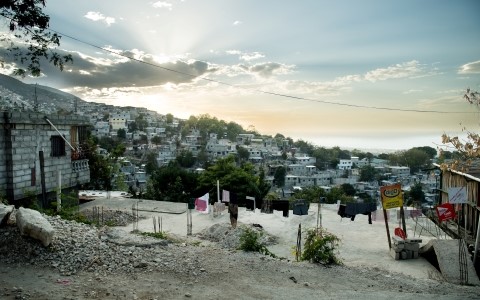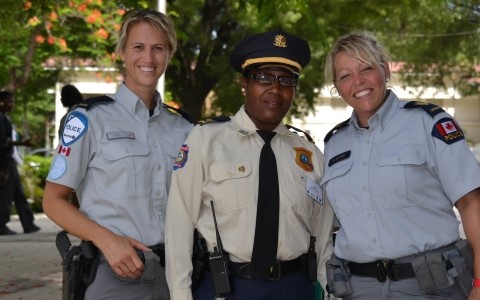Peacekeeping operations
On this page
International Deployment Wellness Program
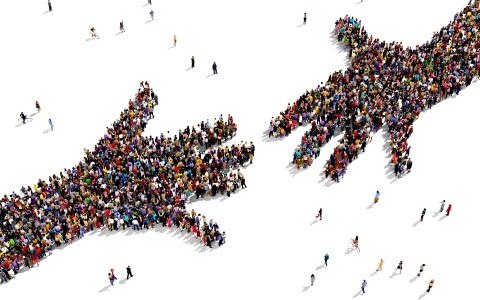
The International Deployment Wellness Program (IDWP) was created to honour the service and sacrifice of Canadian Law Enforcement, Policing Experts and Canadian Police Arrangement partners deployed under International Peace Operations.
This program is built on the foundation of:
- Accountability
- Compassion
- Inclusivity
The program will ensure that those who serve in the service of peace continue to receive the care and support they deserve, both during the mission and when they get home.
The program will also provide support to the family members of those that deploy. They also experience the effects of a deployment. So, it is important to ensure they feel part of the larger RCMP community. They will have the support they need, both during the deployment and the reintegration phase.
Deployed personnel should be as healthy as possible, both mentally and physically. This is not only to be highly effective while deployed, but so that they can continue to be effective back at home. The program will be a 360-degree wellness program: during the mission and beyond.
Below is a Question and Answer segment on Inspector Blayr Schmidt, the Contingent Commander for the Canadian Police Mission in Ukraine.
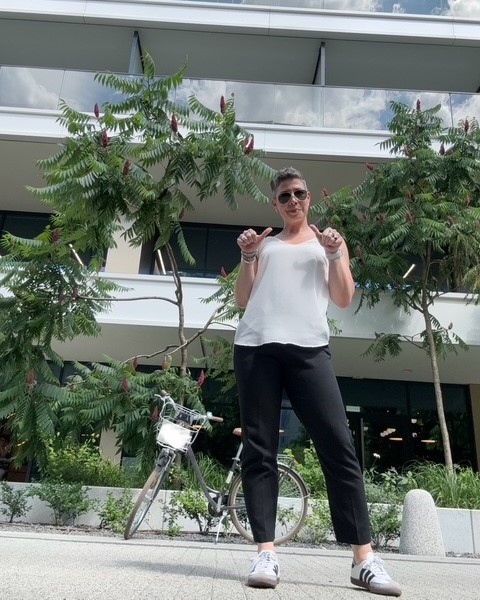
- What do you do while on mission to help manage your mental health?
- I use a free app where you can record video messages and talk to people in the moment when you're thinking of them, and they can review it when they have the time. Being separated by a big distance and many time zones, this helps a lot. I get to talk through something right away with my best friend or partner, especially when I need them. To share a hilarious story or to talk with someone when I need an ear - it helps! Sharing it in the moment with the person I trust is very helpful for my mental health. And it keeps up a solid bond while we're apart!
- What activity have you discovered while deployed that has become a major part of your wellness toolkit?
- Walking and biking!! Warsaw and Kyiv are very accessible cities and you can rent bikes or scooters everywhere. I always try to walk or bike to meetings or errands, just to slow down between tasks. No matter the weather, it is a nice way to remind myself to enjoy the space that I'm in! I really hope to take this habit back home with me.
- As the Contingent Commander, can you give an example of something that you do to ensure your people are taking care of themselves / what do you do to take care of your people?
- In order to take care of my people, I try to lead with vulnerability and transparency. Being open and transparent with my emotions, expectations and decisions allows people to ask questions, feel safe and informed, know they're being heard, be themselves, and know that they can share openly as well. With such a dynamic mission, I ask for my team to be as flexible and responsive as possible. And I need them to have all the information and feel they can rely on one another in any case. I believe leading this way has brought us together and this method takes care of my team more than anything else I could do.
- Is there something that you wish you had known prior to deploying that would have helped with your overall wellness once you arrived in Mission?
- Understanding the change in weather in Eastern Europe and the lack of sunshine! Being from sunny, dry Saskatchewan, I had never experienced the lack of sun or realize the effect it would have on my mental health and well being. I have since taken strides to make sure I add Vitamin D to my diet, get more rest and water, and truly take time to be outside even for a few moments when the sun is out!!
15th Anniversary of the Haiti earthquake
Trigger warning: death
This anniversary and this story may be distressing to some readers. If you feel uncomfortable or require support, please reach out to the appropriate resources available to you.
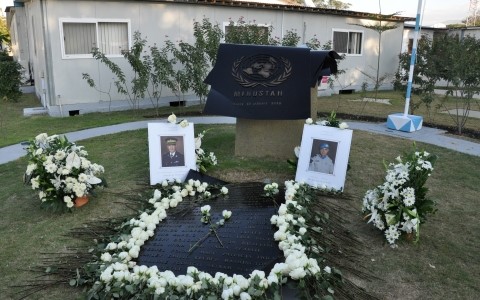
January 12, 2025 marks the 15th anniversary of the devastating 2010 earthquake in Haiti. The RCMP still remembers all the people in Haiti who lost their lives, including Chief Superintendent Douglas (Doug) Coates and Sergeant Mark Gallagher. In their effort to help the Haitian National Police and Haitian citizens, Doug and Mark ultimately gave their lives in the service of peace. Our thoughts are with their family, friends and co-workers during this time of somber remembrance.
In the aftermath of the 2010 Haiti earthquake, members of the Canadian police contingent showed extraordinary bravery and resilience, rescuing hundreds of victims from crumbling buildings, providing crucial first aid and providing much needed security in the turbulent streets of Port-au-Prince.
During the first year after the earthquake, Canada's police peacekeepers were noted as being instrumental in helping to re-establish law and order in Haitian cities and towns. The Canadian police officers also provided crucial community-policing services in the displaced persons camps, where more than one million Haitians lived after their homes were destroyed in the earthquake.
In the beginning, the Canadian police officers provided technical expertise for the establishment of the Haitian National Police Academy, resulting in on-the-job training and professional guidance to more than 5,000 new Haitian police officers deployed throughout the country. As time went on, Canadian police supported the Haitian National Police with security recommendations during Haitian presidential elections and provided strategic advice in the areas of police management, professional policing standards, training and mentoring.
Today, the RCMP continues to support the overall Government of Canada's efforts in Haiti across a range of bilateral and multilateral forums, domestically and abroad. With over 30 years of experience in Haiti, Canadian police have been involved in building the capacity of the Haitian National Police at all levels, from cadets to senior managers, both in Port-au-Prince and in the regions.
In fact, Canadian police continue to play an integral part in Haiti. Haiti remains Canada's largest and longest-standing police contribution to a United Nations peace support operation.
As always, Canadian police remain committed to making a difference and helping restore peace in Haiti, working alongside the Haitian National Police and Haitian citizens.
The changing face of police peacekeeping
Canadian police personnel have deployed on peacekeeping and stabilization operations since 1989. What started off initially with mass deployments of hundreds of police officers has now morphed into specialized and strategically chosen deployments. Why? To create a more impactful and sustained effect.
Hollie in Iraq
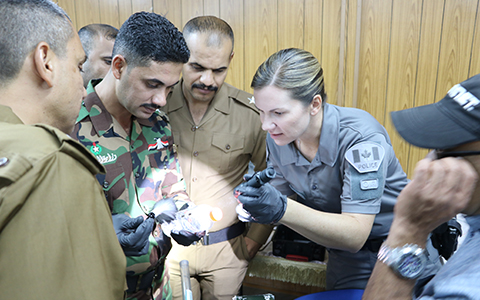
Sergeant Hollie Maffenbeier deployed to Iraq in July 2019. Working alongside police instructors from all over the world, Hollie delivered training in specific areas such as community policing, crime scene management and leadership, along with assisting in the delivery of other training as needed.
"I was excited to be able to organize and deliver a forensic course. And to top it off, a group of women Iraqi officers participated in the forensic course," Hollie explained. "This was only the second time that women Iraqi officers participated in a training course with us."
An avid champion for women police officers, Hollie became the Team Lead at Camp Dublin three months into her deployment.
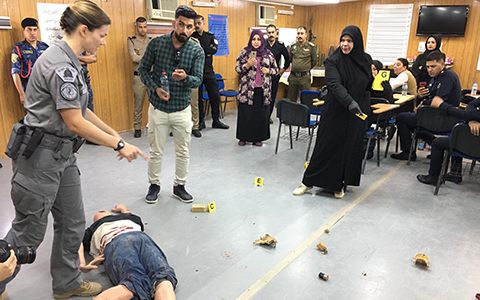
"I learned so much about myself, becoming the Team Lead for the Canadian police deployment at Camp Dublin. I was the only woman Team Lead on base," said Hollie. "I liaised with all the partners and worked with the team. It's amazing the resources you have within yourself that you don't even realize."
That leadership within Hollie came into play with the heightened security risk after the assassination of an Iranian Major General in 2020. This event eventually led to the repatriation of all Canadian police officers back to Canada due to the increased threat level. Hollie was one of the last to leave, working with the Mission Coordinator in Ottawa to ensure that all Canadian police personnel stationed at Camp Dublin were repatriated and that all priority Canadian resources were returned.
Guylaine in Rwanda
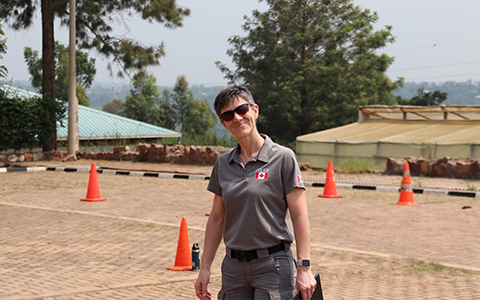
Sergeant Guylaine Brassard travelled to Rwanda for two weeks in January 2024. She was part of a team that was tasked to train women police officers for success in participating on various United Nations missions. This was a unique experience, where a group of pre-qualified instructors deployed on a short-term basis to deliver training to other Police Contributing Countries to United Nations missions.
"By setting these women up for success, we're providing them an opportunity to make a difference on their own deployment," explained Guylaine. "Women need to be involved; they need to have equal and full participation in conflict resolution, peace-building and peacekeeping."
When not supporting these shorter types of missions, Guylaine works in international policing training, helping Canadian police personnel prepare for their own deployments.

Looking ahead
The world is an ever-changing place. It is important to keep pace, adapt and overcome in order to help nations torn by conflict create conditions for lasting peace.
"As global conflicts continue to change, peacekeeping operations continue to adapt to the unique needs and circumstances of each mission. And we will be there leading the change," reiterated Superintendent Rabih Abdallah, Director of International Peace Operations, RCMP.
Preparing for peace operations
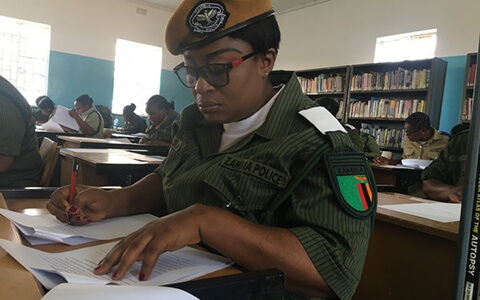
I'm proud that our work is directly supporting the involvement of uniformed women in peace operations around the world.
Sergeant Tai Chang was the team lead of a group of five Canadian police officers deployed to Zambia. They were tasked to train women police officers for success in deploying to United Nations missions.
"This training helped Zambian women police officers prepare for the upcoming Assessment for Mission Service," he explained. "That is a required test for all police officers wishing to participate in a United Nations peacekeeping mission."
Increasing the participation of women in the full spectrum of United Nations policing activities is critical to operational effectiveness and efficiency. In some countries, driving or carrying a firearm is not part of their regular duties, which poses significant challenges to their deployment.

This preparatory training enhances the effectiveness of United Nations peace operations by:
- increasing the deployment of qualified women police officers
- developing a greater understanding of key factors that positively contribute to the deployment of women police officers, and
- enhancing the utilization of women police officers in United Nations peace operations
"We've seen the progress firsthand. We conducted the language portion of the Assessment for Mission Service on the first day of the training to assess the class," Sergeant Chang explained. "Had the Assessment for Mission Service occurred without our assistance, the pass rate would have been approximately 48% for the language portion. By the end of the first week of training, we saw the pass rate for language assessment increase to 90%!"
The ratio of instructors to candidates is 1:10 for each training session. Each course lasts two weeks. On average, 50 candidates attend each training session. The sessions take place in the host countries, and Canada sends five instructors per session to provide training.

"I really feel that I can bring something concrete and beneficial to every woman that we're instructing," elaborated Sergeant Audrey-Anne Bilodeau of the Sûreté du Québec. "For example, with just one morning of providing tips and suggestions, every single Zambian participant passed the driving test within the allotted time and without knocking over any cones!"
The equipment and materials Canada purchased through the Elsie Initiative, combined with the training provided by the Canadian police officers, enabled the Zambian participants to acquire new skills that will undoubtedly help them during the Assessment for Mission Service and in their deployment in a peacekeeping mission.
Canadian expertise is highly valued, and these deployments are an opportunity to improve the capacity of other Police Contributing Countries to United Nations missions.
- Date modified:
